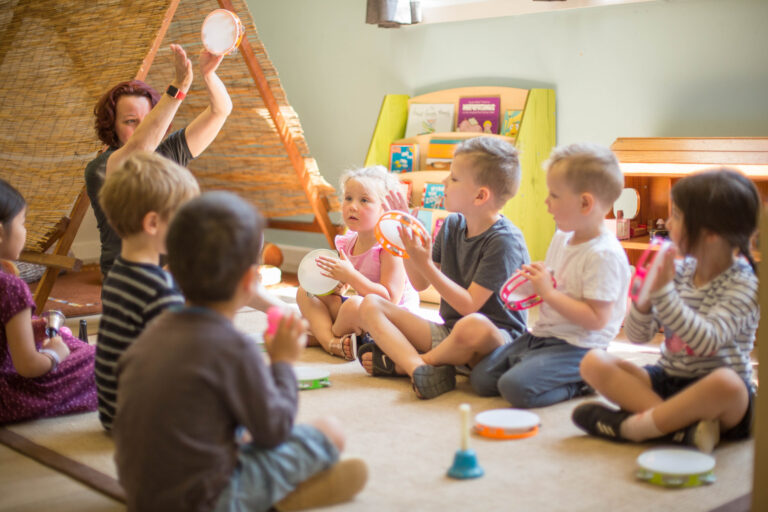
Music is a universal language that transcends cultural and linguistic barriers, resonating deeply within the human experience. In early childhood, the impact of music extends far beyond mere entertainment. It plays a pivotal role in cognitive development, emotional growth, and social skills, setting the stage for a well-rounded and fulfilling life. Let’s delve into the myriad benefits of music in early childhood and explore why it’s a crucial element in nurturing young minds.
1. Cognitive Development
Enhancing Memory and Learning: Music stimulates brain development in young children, enhancing their ability to process information. The repetitive patterns and rhythms in music help improve memory and attention span. Songs and rhymes often serve as mnemonic devices, aiding in the retention of information such as the alphabet, numbers, and new vocabulary.
Boosting Language Skills: Exposure to music at an early age is closely linked to advanced language development. Singing along to songs helps children understand the nuances of language, including pitch, tone, and rhythm. It also introduces them to new words and phrases, expanding their vocabulary and improving their pronunciation.
2. Emotional Growth
Expressing and Understanding Emotions: Music provides a safe outlet for children to express their emotions. Through singing, dancing, or playing instruments, children can convey feelings that they might not yet have the words for. This emotional expression helps them develop empathy and emotional intelligence, as they learn to recognize and understand their own emotions and those of others.
Promoting Relaxation and Reducing Stress: Listening to soothing music can have a calming effect on children, helping to reduce stress and anxiety. It creates a peaceful environment conducive to relaxation and can be particularly beneficial during nap times or after a long day of activities.
3. Social Skills and Cooperation
Fostering Social Interaction: Participating in musical activities, such as group singing or instrument play, encourages children to interact with their peers. These activities promote teamwork and cooperation, as children learn to listen to each other and work together to create harmonious sounds.
Building Confidence and Self-Esteem: Performing in front of an audience, whether it’s a small group of peers or family members, can boost a child’s confidence and self-esteem. Mastering a song or an instrument provides a sense of achievement and encourages children to take pride in their abilities.
4. Physical Development
Improving Motor Skills: Playing musical instruments or engaging in rhythmic movement activities helps develop fine and gross motor skills. Clapping, tapping, and dancing to music enhance coordination and spatial awareness, contributing to overall physical development.
Encouraging Healthy Physical Activity: Dancing to music is a fun way for children to stay active. It promotes cardiovascular health and helps develop strength and flexibility, all while allowing children to enjoy themselves and express their creativity.
5. Cultural Awareness and Appreciation
Introducing Diversity: Music exposes children to different cultures and traditions, fostering an appreciation for diversity. Through music, children can learn about various musical styles, instruments, and cultural practices from around the world, broadening their understanding and respect for different cultures.
Encouraging Creativity and Imagination: Engaging with music sparks creativity and imagination. Children often create their own songs, rhythms, and dances, exploring their creative potential and developing problem-solving skills as they experiment with different sounds and movements.
Benefits of Music in Early Childhood
Incorporating music into early childhood education is not just about nurturing future musicians; it’s about fostering holistic development in children. The cognitive, emotional, social, physical, and cultural benefits of music provide a strong foundation for lifelong learning and personal growth. Whether it’s through listening, singing, dancing, or playing instruments, the harmonious journey of music enriches the lives of young children, helping them grow into well-rounded and confident individuals.
Here at Aussie Kindies, music plays an important role in the Lifelong Learning Curriculum. By recognising and embracing the power of music in early childhood, parents, educators, and caregivers can create enriching environments that support the development and well-being of every child. So, let the music play, and watch the magic unfold in the hearts and minds of our youngest learners.